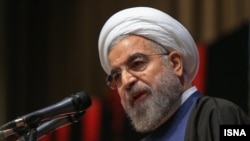Iranian President Hassan Rouhani spoke to the country Saturday, a day after nuclear talks between Iran and world powers, including the U.S., broke off, allowing the Iranian delegation to return home following the death of the president's 90-year-old mother.
Mr. Rouhani said in the taped, televised address to commemorate Nowruz, the Persian New Year, "World countries and big powers have realized that threats and sanctions are ineffective and the correct approach is to show understanding, agreement and respect towards the Iranian nation. We have stabilized the nuclear rights of this nation. We have broken apart the organization of sanctions and this nation will be successful in achieving its lofty goals."
The parties have been meeting since Tuesday in Lausanne, Switzerland. Iran's ISNA news agency reported the negotiations will resume Wednesday. But the U.S. State Department gave no information Friday on where and exactly when the talks will start up again.
Nearly a week of talks on curbing Iran’s nuclear program ended with mixed reports. Some officials privately report progress between the Islamic Republic and six world powers. But others see a gap.
Iran and the P5 plus 1 nations -- Britain, China, France, Russia, United States and Germany -- face a March 31 deadline for a framework agreement.
Under an agreement, Iran would limit its uranium enrichment to prevent it from building a nuclear bomb. In exchange, the world powers would lift the sanctions that have wrecked the Iranian economy.
Iran denies wanting a bomb and insists its nuclear program is for peaceful civilian purposes.
The White House says President Barack Obama spoke to French President Francois Hollande Friday by telephone. They agreed that Iran must take steps to resolve the remaining issues in the nuclear talks.
Meanwhile, Secretary of State John Kerry offered "deepest condolences" to Rouhani's family and country, and also wished the people of Iran a good Persian new year, or Nowruz.
"Nowruz is the beginning of Spring, and in Farsi, it means 'new day,'" said Iranian Foreign Minister Mohammad Javad Zarif, appearing with Kerry in Lausanne.
"I hope this new day will be a new day for the entire world – a new era of greater understanding and peace," said Zarif, echoing Kerry's hope that the year will bring "progress and peace."
Details of the agreement are due to be finalized by July.
Messages of hope
In a written message marking the holiday, Kerry praised the opportunity the represented by negotiations between Iran and the six world powers: the United States, plus China, France, Germany, Russia and the United Kingdom.
"It is my sincere hope that if Iran's leaders make the right choices – the necessary choices – in the ongoing nuclear talks … this new year and this new spring will mark a better future both for the Iranian people and for the world," he said.
In his own Nowruz message to Iranians, U.S. President Barack Obama said this year represents the "best opportunity in decades" to pursue a different relationship between the two countries.
"This moment may not come again soon,” he said in a White House video. “I believe that our nations have an historic opportunity to resolve this issue peacefully – an opportunity we should not miss.”
Obama said Iran's leaders have the choice to agree to a "reasonable" nuclear deal, which he said would end Iran's international isolation and provide "greater opportunities for the Iranian people."
If a deal is not reached, the president said Iran will continue on "a path that has isolated Iran, and the Iranian people, from so much of the world, caused so much hardship for Iranian families, and deprived so many young Iranians of the jobs and opportunities they deserve."
'Engage with dignity'
Foreign Minister Zarif said Friday via Twitter that "Iranians have already made their choice: Engage with dignity. It's high time for the U.S. and its allies to choose: pressure or agreement."
Iran claims its nuclear program is only for peaceful purposes, such as providing energy, but many countries fear it is trying to build a nuclear bomb.
After talks on Friday in Brussels with European Union leaders involved in the negotiations, EU foreign policy chief Federica Mogherini said there were no differences between the Americans and the Europeans on the way forward.
"There is unity [in] the fact that we want a deal. We want a good deal ... that makes it impossible for Iran to develop a nuclear weapon," Mogherini said. "This would be beneficial for Iran, for sure, for the security of the region, for nonproliferation, so for the security of the world."
Negotiators have made progress, "but gaps remain," Obama said. He added that some people in the United States, Iran "and beyond … oppose a diplomatic resolution."
U.S. officials are downplaying a report suggesting Washington and Tehran are drafting elements of a nuclear deal that commits Iran to a 40 percent cut in the number of machines it could use to make an atomic bomb.
The Associated Press report, which quoted unnamed officials, said that in return, Iran would get quick relief from some crippling economic sanctions and a partial lifting of a U.N. embargo on conventional arms.
State Department spokeswoman Jen Psaki on Thursday dismissed such reports as "inaccurate," and insisted no draft document is being circulated.
"The fundamental framework issues are still under comprehensive discussion," she said, saying that’s what Kerry "is focused on now."
Lisa Bryant contributed to this report from Paris.





